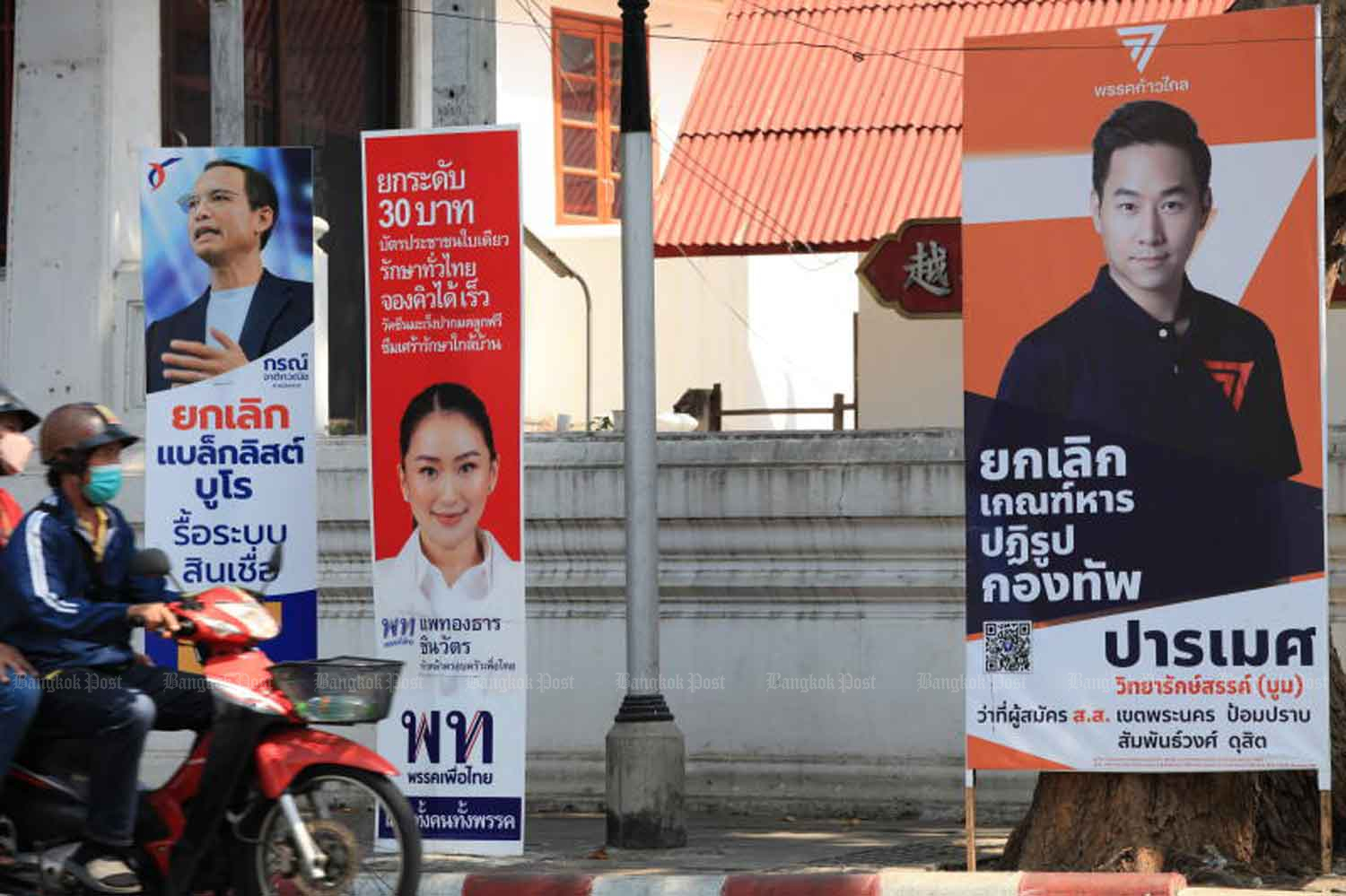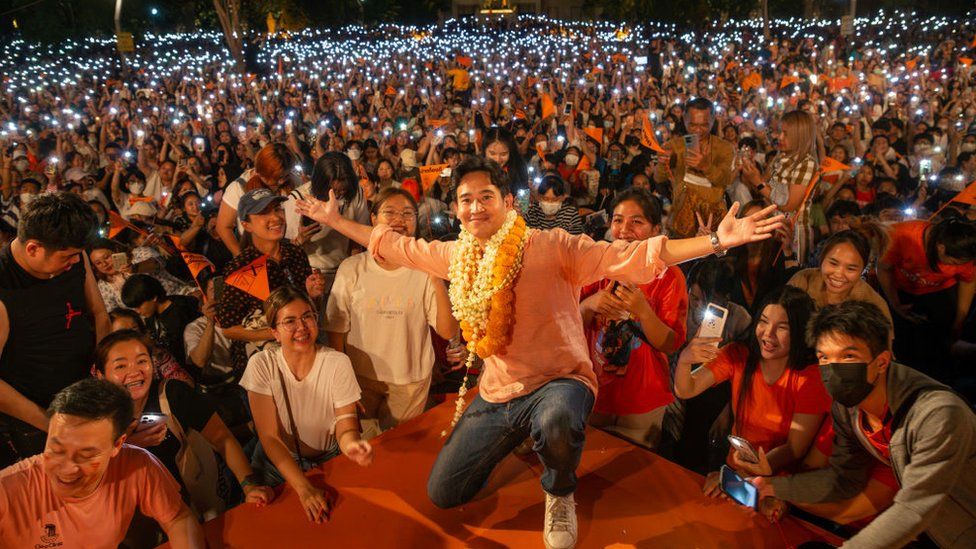News
Vote Buying Accusations Surround Thailand’s 2023 Elections

The main prime ministerial candidates of Thailand’s political parties made a final effort to rally supporters on Friday, two days before a crucial general election, surrounded by adoring audiences crowded inside stadiums and halls.
Following nearly a decade of a government headed or supported by its royalist military, approximately 52 million eligible voters in Southeast Asia’s second-largest economy will cast ballots on Sunday.
“We must love one another.” “We are Thailand, we are a family,” Prime Minister Prayuth Chan-ocha, a former army chief who led a 2014 coup and now leads the newly created United Thai Nation party, stated.
“If we don’t get elected, I won’t be here… will you miss me if I’m not here?” Because I shall miss all of you,” he said in an emotional plea, seeking to lead conservatives to victory over the populist Pheu Thai party, which is backed by the billionaire Shinawatra family.
For nearly 20 years, Thai politics has been defined by a heated rivalry between pro-military, royalist conservatives and a brash, technocratic opposition, much of which has featured bloody street fights and two coups.
According to a Reuters poll, the Pheu Thai Party is projected to win the most seats, extending its streak of good victories in every election since 2001, including two landslides.
Paethongtarn Shinawatra, the youngest daughter of family patriarch Thaksin Shinawatra, and real estate billionaire Srettha Thavisin are among its prime ministerial contenders, both of whom have limited political experience.
“The 14th of May will be a historic day.” “We will transition from a dictatorship to a democratically elected government,” Paethongtarn, 36, told hundreds of fans at her first rally since delivering birth in the middle of the campaign.
Another significant opposition party, the Move Forward Party, has witnessed a late-stage rise and is betting on young people, including 3.3 million eligible first-time voters aged 18 to 22.
The party has pledged significant changes, such as challenging business monopolies and abolishing military conscription, as well as modifying a stringent ban on royal insults, which opponents claim is used to muzzle dissent.
“I believe that they will make Thailand a better place,” Thanarath Srisombat, 26, said during the Move Forward demonstration. “Before this, I would have preferred to relocate to another country, but now I want to stay here and see how things improve.”
While the struggle between old and new political groups is on many voters’ thoughts, the economy is also looming large in a country highly reliant on tourism and hit hard by the COVID outbreak. Tourists and growth are returning, but unsustainable levels of family debt are clouding the future, and all parties are pledging dramatic solutions.
However, a major issue hovering over the election is whether the military-dominated establishment will allow the people’s will to be carried out with the formation of a new government.
The party that wins the most seats in the 500-seat House of Representatives under the 2017 constitution crafted by the military may struggle to build a coalition because the prime minister is also chosen by a 250-seat military-appointed Senate.
There is always the risk of street protests resuming if a party that wins a large number of votes is denied the opportunity to gain power by laws that many critics think were designed to cement military influence over civilian affairs.
“If voters are disenfranchised again, we should expect violent protests,” said Fuadi Pitsuwan of Chiang Mai University’s School of Public Policy, referring to the dissolution of political parties such as past iterations of Pheu Thai and Move Forward.
Vote buying can be a deciding factor in Thai elections at any level – whether for a village head, a local administrator, or a member of Parliament. And the upcoming general election on May 14 is no exception, according to analysts and even politicians themselves.
Many Thai election candidates have blamed their defeat on vote buying, while several election wins have been attributed to parties buying votes.
Last week group of villagers from the northeastern Thai province of Khon Kaen Thailand filed a petition with the provincial election committee, accusing a Pheu Thai Party candidate of vote-buying.
The people from Ban Non Ruang village in Muang district’s tambon Ban Kho were accompanied by Pongsak Songnok, the local headman, and a lawyer when they presented the petition to Vachara Seesarn, director of the Khon Kaen election committee’s office.
Mr Vachara reportedly received photos and video clips of money being distributed to villagers who attended a rally in the village to hear a Pheu Thai candidate speak.
Following the petition’s official acceptance, detectives from the Khon Kaen election office began interviewing the petitioners in an investigation room. Outsiders and journalists were not permitted.
The village chief, Mr Pongsak, stated that he accompanied the residents to provide moral support. He stated that the election committee was currently under scrutiny.
The lawyer, who did not want to be identified, stated that he was serving as a legal advisor to the villagers who observed the alleged scam.
Mr Vachara, director of the provincial election committee, stated that the petition was being reviewed and that the petitioners were being held as witnesses. The documents and evidence supplied would be evaluated, and the witnesses would be interviewed further, to determine whether the accusation was justified.
Vote buying has long been a concern in Thai politics. Vote buying is an unlawful and criminal offence in Thailand. Nonetheless, despite the prohibition, vote buying persists in many parts of the country.
Vote buying is a practise in which politicians or their supporters provide voters with monetary or material incentives in exchange for their votes. Cash, food, presents, and other rewards can be used as incentives.
In Thailand, the problem of vote buying is frequently linked to poverty, since many voters are willing to sell their votes for money or other benefits in order to make ends meet. Furthermore, a lack of education and understanding about the significance of voting may contribute to the prevalence of vote buying.
To prevent vote buying, the Thai government and the Election Commission have implemented a variety of measures, including increasing penalties for anyone discovered engaging in the practise and encouraging voter education and awareness. However, these approaches have had only little success in addressing the issue.
Overall, vote buying continues to be a big threat to Thailand’s democratic process.
Thailand’s Cannabis Shops Face Extinction
Thailand’s Cannabis Shops Face Extinction After May 14 Election


































